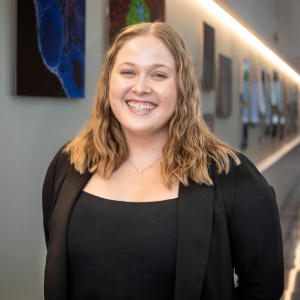
March 2025 Newsletter

March 2025 Newsletter

Student Profile
Rosie Bauer is a fifth-year PhD student in the Driskill Graduate Program.
While studying biology at Lawrence University, Bauer took an interest in genetics and biomedical research. There, she fell in love with the scientific process.
Now in the laboratory of Margrit Urbanek, PhD, associate professor of Medicine in the Division of Endocrinology, Bauer’s research centers on understanding the genetics at play in polycystic ovary syndrome (PCOS).
Where is your hometown?
I grew up in Elm Grove, Wisconsin, a suburb outside of Milwaukee.
What sparked your interest in science or medicine?
I’ve always been interested in how human bodies work, and I loved biology classes in high school, but it wasn’t until I stumbled upon an undergraduate research experience that I learned about the field of academic biomedical research. My college genetics professor convinced me to work in her lab for a summer, and she taught me to love genetics, C. elegans and the scientific process.
What are your research interests?
I am interested in using human genetics to inform our understanding of human diseases and to advance treatment.
What are you currently working on?
My PhD work focuses on using genetics to investigate a common endocrinopathy called polycystic ovary syndrome (PCOS). I am particularly interested in the overlap between genetic causes of insulin resistance and the development of PCOS. We hope that this work will inform the treatment of PCOS and also inform the development of genetic approaches to common complex diseases.
Please tell us about a defining moment in your education at Feinberg thus far.
As part of the Center for Reproductive Science’s T32 training program, I was required to complete an internship during my third year. I was able to intern at Lurie Children’s in their Molecular Diagnostics Lab, and I learned so much about career paths in clinical genetics. I am so grateful for the connections I made and the motivation it gave me to finish my degree.
What do you hope to do with your degree?
I hope to use the skills I’ve developed during my PhD to work in the field of clinical diagnostics, either at a commercial genetic testing company or an academic molecular diagnostics lab.